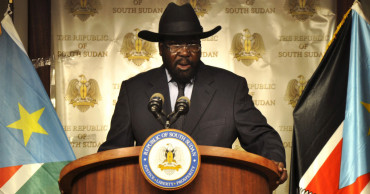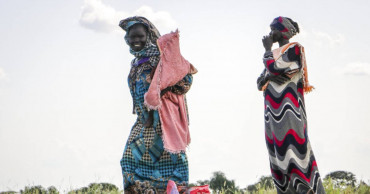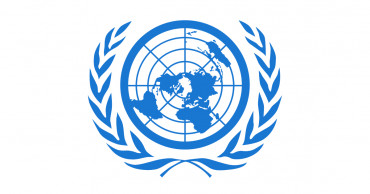South Sudan
South Sudan's sluggish peace deal and unsteady road to elections
Martha Nyanguour didn't have time to bury her husband, son or granddaughter when they were killed by gunfire in September. Instead, the 50-year-old paid her respects by throwing bits of grass over their bodies, grabbed her remaining children and fled.
It had taken years for the mother of seven to muster the courage to return to South Sudan and trust its fragile peace deal ending a civil war. But weeks after she arrived in Atar town in Upper Nile state, fighting erupted between militias aligned with government and opposition forces.
Also Read: Abducted Bangladeshi peacekeeper rescued in South Sudan
"I thought if there was peace I was supposed to go back to my land," said Nyanguour, seated under a tree in Kowach village in Canal Pigi county where she now lives with thousands of other displaced people, five days' walk through swamp water from her home village. "I thought maybe there would be peace in the future, but now, hearing gunshots daily, I think South Sudan will remain in war."
In 18 months, South Sudan is supposed to hold its first presidential elections, the culmination of the peace agreement signed nearly five years ago to pull the young nation out of fighting that killed some 400,000 people. While large-scale clashes have subsided, violence in parts of the country persists, killing 2,240 people last year, according to the Armed Conflict Location & Event Data Project. Earlier this month at least 20 people were killed and more than 50 wounded during inter-communal clashes in a United Nations protection camp in the north of the country.
Also Read: South Sudan struggles to clear mines after decades of war as people start returning home
Implementation of the peace agreement has been sluggish. The elections, originally scheduled for this year, were postponed until December 2024. Other key elements of the deal have not been implemented, sparking concern that the country could see a return to war instead of a transfer of power.
"We are going to go for (the) electoral process without meeting the benchmarks that create a conducive environment for the conduct of elections," said Edmund Yakani, executive director for Community Empowerment for Progress Organization, a local advocacy group. "The return of the country to violence is more evident than the country staying in stability."
A permanent constitution still has not been drafted. A census has not been conducted. Security arrangements, considered the backbone of the agreement, are only partially complete. Some 83,000 soldiers from opposition and government forces are meant to unite in a national army, but so far 55,000 have graduated and are yet to be deployed.
Also Read: Thousands of exhausted South Sudanese head home, fleeing brutal conflict
Others languish in training centers with poor conditions and little food. Soldiers say many are rarely paid. Locals involved with the security arrangements say there's so little trust that the main parties have held back key fighters, sending less seasoned ones or new recruits.
In addition, Joshua Craze, a researcher on South Sudan, says, "The peace agreement signed in 2018 has enabled the government to fragment the opposition by encouraging defections and setting commanders against each other, intensifying violent conflict."
The opposition accuses the government of lacking political will to hold elections so it can keep plundering the nation's resources, which include oil. "They don't have genuine political will to implement the peace agreement because they look at the agreement from the angle that it is crippling their powers," said Puok Both Baluang, acting press secretary for the first vice president, head of the main opposition and former rebel leader Riek Machar.
South Sudan has billions of dollars in reserves but there is little transparency on where the money goes. The country was voted the second most corrupt in the world last year by Transparency International.
The international community is exasperated with South Sudan's lack of progress.
At a press conference in May, United Nations representative Nicholas Haysom cautioned that the conditions did not currently exist to hold transparent, free and fair elections. But some diplomats are concerned that another extension to the peace deal would send a negative message to South Sudanese citizens, investors and aid donors.
The government says it's serious about the peace process and will hold elections on time. During a conference in May on reconciliation and healing, President Salva Kiir vowed that "I will never take South Sudan and its people to war again."
The capital, Juba, appears peaceful. Billboards of Kiir and Machar shaking hands above the words "peace, unity, reconciliation and development" line the streets. Children of the political elites are returning with money and opening trendy restaurants, and construction is booming.
But outside the capital is a different reality.
The fighting that killed Nyanguour's family last year also sent tens of thousands fleeing, part of the highest displacement levels since the peace agreement was signed, according to a report by a U.N. panel of experts. It said government and opposition forces played facilitating roles in the violence.
The conflict in Upper Nile cut off access to healthcare, with some severely wounded people having to travel up to four days by canoe to the closest clinic, aid workers said. "The biggest issue was accessibility. It was hard to bring in supplies," said Kudumreng David, a supervisor for the International Medical Corps in Kowach.
Food has also become scarce as fighting worsens conditions after years of floods and cuts in food aid. In Kowach, some children rip leaves from trees into a pot for their only meal of the day.
Many people outside Juba said they didn't even know elections were set for next year.
"We heard there's peace but it hasn't reached here," said Roda Awel, a resident of Kowach. "People are still afraid."
2 years ago
South Sudan struggles to clear mines after decades of war as people start returning home
For the first time since fleeing South Sudan's civil war eight years ago, Jacob Wani returned home excited to rebuild his life.
But when the 45-year-old farmer tried to access his land in Eastern Equatoria state's Magwi County, he was banned, told that it had been labeled hazardous and contaminated with mines.
"My area is dangerous," Wani said, standing in his shop in Moli village where he now lives, a few miles from the farm. "I do not have the capacity to rebuild in this place and I am also afraid (of explosives). If I go, maybe something can hurt me."
As South Sudanese trickle back into the country after a peace deal was signed in 2018 to end a five-year civil war that killed nearly 400,000 people and displaced millions, many are returning to areas riddled with mines left from decades of conflict. More than 5,000 South Sudanese have been killed or injured by land mines and unexploded ordnance since 2004, according to the U.N. Mine Action Service (UNMAS).
South Sudan is trying to clear all anti-personnel minefields and cluster munitions in the country by 2026.
While more than 84 million square meters of cluster munitions and mines have been cleared in nearly two decades, according to UNMAS — equivalent to approximately 15,000 American football fields — experts doubt that the deadline will be met as munitions are being found across the country daily. Ten people were killed in March after mistakenly playing with a grenade in a remote village in Western Bahr el Ghazal State.
"The contamination is too huge," said Jurkuch Barach Jurkuch, chairperson for South Sudan National Mines Action. Efforts are also complicated by a lack of funding, continued insecurity and flooding during the rainy season, he said.
Eastern Equatoria state, along the border with Uganda, is South Sudan's most heavily contaminated area, hit by wars with northern Sudan before gaining independence in 2011, fighting with the Lord's Resistance Army led by Uganda's notorious warlord Joseph Kony and South Sudan's civil war.
By the end of 2021, the state had the most areas with cluster munitions in the country — 55 out of a total of 123 — according to Mine Action Review, which does global mine analysis. The state is also the second most returned to in the country since the peace agreement, with more than 115,00 people coming back, according to the U.N.
During a visit to Magwi County in May, families told The Associated Press that they had their food rations cut by 50% in refugee camps in Uganda, which pushed them to come back hoping they'd be able to cultivate. But people are returning to the remnants of conflict-riddled villages, with little food, shelter or open schools, all of which is compounded by the mines. In some communes, more than half of the area is contaminated, locals say.
"Whenever there is a land mine, there is a danger. So everybody fears to go cultivate and do activities in the bush because of fear of land mines," said Sebit Kilama, a community leader.
Private contractors and aid groups are trying to clear the area from contamination, but say the task is enormous.
During clearance in a cluster munitions site in May by the aid group MAG, focused on mine clearance, 16 unexploded munitions were found in less than a week of work. Locals are also finding devices a few miles from main roads. When AP journalists visited, a villager alerted the demining team of an unexploded 60 millimeter mortar shell, which he found a few miles into the brush.
MAG is working with communities to raise awareness about the danger of mines and other unexploded ordnance.
"Land mines don't have an expiry date," said Clara Hayat, a community outreach officer with MAG, during a talk to a group of children in a village where people recently returned from Uganda.
"Don't bring them home, because they can kill," she said.
2 years ago
UN: South Sudan struggling to implement power-sharing deal
South Sudan is facing violent clashes and increasing disillusionment and frustration as it struggles to implement the most challenging provisions of a fragile 2018 power-sharing agreement, U.N. experts say in a new report.
The world's newest nation is struggling to integrate rival military forces, draft a new constitution and prepare for its first election as an independent country in December 2024, the experts monitoring sanctions against the world’s newest nation said in a report to the U.N. Security Council obtained Friday by The Associated Press.
The country's stability “will likely turn on the government’s ability to reward the patience of those who remain committed to peace, rather than those who have sought to reshape it through violence," the report says.
There were high hopes when oil-rich South Sudan gained independence from Sudan in 2011 after a long conflict. But the country slid into a civil war in December 2013 largely based on ethnic divisions when forces loyal to the current president, Salva Kiir, battled those loyal to the current vice president, Riek Machar.
Tens of thousands of people were killed in the war, which ended with the 2018 peace agreement, bringing Kiir and Machar together in a government of national unity. Under the agreement, elections were supposed to be held in February 2023, but last August they were postponed until December 2024.
Kiir said he wanted to avoid creating conditions for more bloodshed. He issued a statement outlining the government’s achievements and stressing that it would be “business as usual” before the elections.
Also read: 675 Bangladeshis reach Port Sudan to leave crisis-hit Sudan: Shahriar Alam
The U.N. experts said the message was aimed at allaying two concerns — that the extension would be used to undermine the fragile power-sharing structures and would mean further delays, “not the progress that peace once promised.”
On the plus side, the panel said in the 37-page report that the unity government has survived, a series of laws have started to pave the way for the drafting of a new constitution, and a first batch of approximately 55,000 unified troops has graduated, even though most haven’t been deployed.
On the negative side, the experts said, most troops that graduated remain around their training centers, “though poor conditions have led to hundreds of deaths and thousands of desertions.” Many graduates don’t receive regular salaries, and most work in local communities to make money, the experts said.
Those that have been deployed appear to have joined pre-existing military units rather than becoming part of a new national force, they said. While the parties agreed last year to unify the top command structure, they have not been able to reach a similar agreement for the lower ranks.
South Sudan is also facing its highest level of displacement since the peace agreement, and more than two-thirds of the population needs humanitarian assistance, the panel said.
The experts said most South Sudanese have not seen “tangible progress” since the 2018 agreement was signed.
The deteriorating humanitarian situation is partly the result of violence and serious clashes in most parts of the country between well-armed rival forces, leading to deaths, people fleeing their homes, serious human rights violations, including sexual attacks, and difficulties delivering aid, the panel said.
Much of the violence results from efforts to weaken opponents, but increasingly “from growing dissatisfaction with the political process in Juba," the capital.
Oil accounts for more than 90% of the government’s revenue and almost all its exports, and as a result of the high oil price the government is likely to exceed its budget target of $1.6 billion in gross oil revenues for the current fiscal year, the experts said, but the money has largely failed to reach institutions that could help stabilize the country.
“The misappropriation and diversion of public resources not only continues to fuel political competition but also deprives the treasury of the resources needed to address the ongoing humanitarian crisis, fund the implementation of the peace agreement, and stabilize the country through regular salary payments and development,” the panel said.
2 years ago
South Sudanese delegation arrives in Dhaka
A South Sudanese delegation led by Deputy Minister of Foreign Affairs and International Cooperation Deng Dau Deng Malek arrived here on Monday morning.
Director General (Africa) Md. Tarikul Islam received the delegation members.
The delegation will have a series of meetings during their stay in Bangladesh.
Read: Dhaka-Washington’s 8th partnership dialogue likely in March-end
The delegation is scheduled to have a meeting with Foreign Minister Dr AK Abdul Momen this (Monday) evening.
The delegation members will also meet State Minister for Foreign Affairs Md Shahriar Alam.
4 years ago
South Sudan names road after Bangladesh
The South Sudan government has named a road in its capital Juba as "Bangladesh Road".
It was constructed with the help of the Bangladesh UN Peacekeeping Engineering contingent.
The Bangladesh UN Peacekeeping Engineering contingent received lots of applause from the people and the government of South Sudan for their pro-people construction works, said the Ministry of Foreign Affairs on Saturday.
Foreign Minister Dr AK Abdul Momen met with the South Sudanese acting Defence Minister Gen. Chol Thon Balok at his office in Juba on Friday.
READ: Bangladeshi peacekeepers boost country's image globally through dedication, efficiency: FM
4 years ago
10 killed in South Sudan plane crash
Ten people were killed in a commercial plane crash in South Sudan's Jonglei state on Tuesday evening, a senior government official said Wednesday.
5 years ago
South Sudan's rival leaders form coalition government
South Sudan has opened a new chapter in its fragile emergence from civil war with rival leaders forming a coalition government.
6 years ago
South Sudan President rejects reduction of number of states after consultation
South Sudan's President Salva Kiir on Friday rejected any possible reduction in the current number of 32 states after consulting with local leaders in Juba.
6 years ago
South Sudan ignores reports on oil pollution, birth defects
The oil industry in South Sudan has left a landscape pocked with hundreds of open waste pits, the water and soil contaminated with toxic chemicals and heavy metals, according to four environmental reports obtained by The Associated Press.
6 years ago
UN says South Sudan at risk of desert locust invasion
The UN Food and Agriculture Organization (FAO) on Tuesday said South Sudan is at a high risk of invasion by desert locust amid worsening food security situation in the country.
6 years ago




.jpg)











